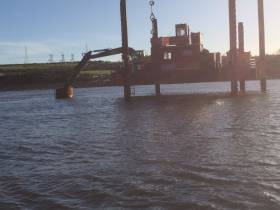Displaying items by tag: Shannon River Crossing
Shannon River Crossing Project to Install High-Voltage Cable
#Project - The "Shannon River Crossing" project is currently underway to install a high-voltage submarine cable linking counties on either side of the river.
The project conducted by ABCO Marine (Irl) Ltd aims to provide electricity between Kilpaddoge, Co Kerry and Moneypoint, Co Clare across the opposite banks along an underwater route of approximately 3km.
The project invloves the supply, installation and commissioning of a High Voltage Alternate Current (HVAC) comprising 21km of submarine cable. ABCO have mobilised the C57 Red Squirrel Jack Up Barge and workboats to support the marine trench excavation operations in support of the Kilpaddoge cable landings.
Currently ABCO's marine personnel, including support from ABCO Divers Ltd are on site completing the cable protection and marine trench backfilling operations. The site is challenging with significant tides as well as strong tidal currents, with all activities programmed and risk managed to maximise productivity whilst maintaining the highest H&S standards.
Commenting on the project, Brendan Osborne, ABCO's Marine Director, said: "We mobilised to the project in December to support the cable installation and marine trench excavation, the seasonal factors place increased risk on marine operations.
Our site team have excelled in the delivery of our operations to the clients satisfaction in a challenging and demanding work environment”.





























































